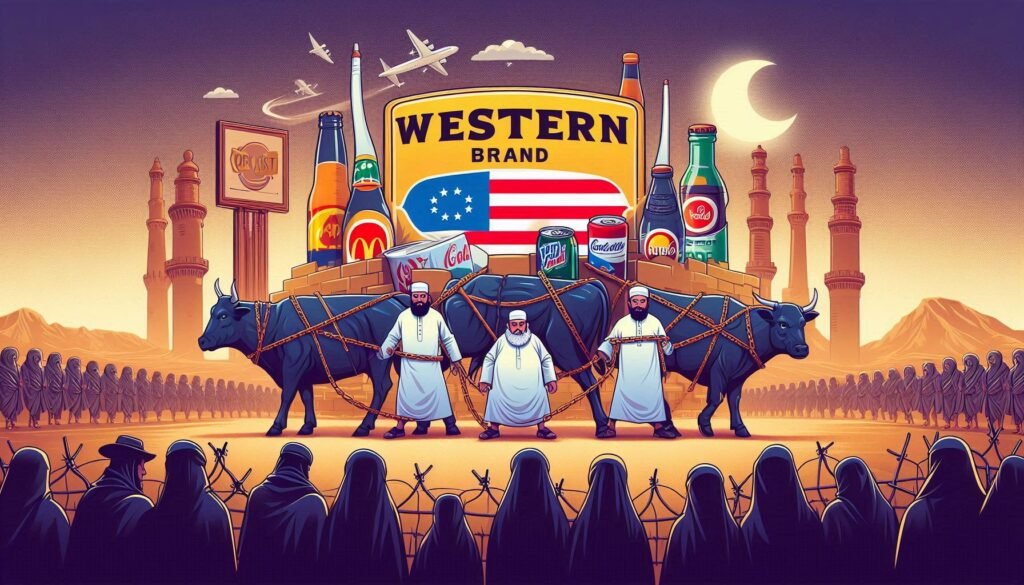
Western brands have long vied for dominance in global markets, but the tides are changing, particularly in the Muslim world. In recent times, major Western companies have found themselves embroiled in controversies, sparking boycotts that pose significant challenges to their operations. This blog delves into the complex landscape these brands navigate as they face an escalating backlash in several Muslim-majority countries.
The Persistent Paradox of Globalization
In the age of globalization, Western brands penetrate markets across continents, seizing upon opportunities provided by a global consumer base. But what works in one corner of the world can lead to unforeseen complications in another. Companies that once basked in the glow of international success now encounter the paradox of globalization—the tighter the weave, the riskier the entanglement.
The Buildup to Boycotts
The past few years have seen a growing sense of discontent towards Western brands in Muslim-majority nations. This dissatisfaction stems from multiple factors:
- Cultural Insensitivity: Some Western brands have launched marketing campaigns or products deemed offensive or inappropriate, sparking outrage.
- Political Endorsements: Financial or vocal support for policies or figures viewed as harmful to Muslim communities has incited boycotts.
- Social Media Magnification: Online platforms amplify dissent, orchestrating widespread boycotts far more effectively than in the past.
One striking example is the backlash against French products following controversial comments by French political leaders regarding Islam. French President Emmanuel Macron’s stance on Islamic separatism, as well as the publication of caricatures of the Prophet Muhammad, provoked mass boycotts of French goods across the Muslim world.
Brand Responses: Damage Control and Rebuilding Trust
Facing such coordinated boycotts, Western brands are forced into a delicate dance of damage control and rebuilding trust. Their strategies span a spectrum:
- Corporate Apologies: Issuing public apologies to acknowledge cultural missteps and pledging corrective measures.
- Localized Marketing: Tailoring campaigns to resonate with local sentiments and values, emphasizing respect and inclusivity.
- Regional Alliances: Partnering with local influencers and businesses to rebuild goodwill and authenticity.
One notable case is that of Nike, which faced backlash for a line of sneakers seen as disrespectful to Muslim communities. Nike quickly responded with an apology and pulled the controversial product from stores, demonstrating a commitment to respect cultural sensitivities.
The Ethical Tightrope
Walking the ethical tightrope between profit and principle remains a daunting task for Western brands. A concerted effort to understand local customs and values becomes imperative, but balancing this with corporate values and political pressures from home countries often places brands in a precarious position.
Empathy and Education stand as the cornerstones for brands to navigate these complex scenarios. By investing in cultural education and empathetic marketing strategies, brands can prevent controversies before they arise and fortify their position in diverse markets.
Long-term Implications for Global Commerce
The immediate impact of boycotts on Western brands is visible: drops in sales, diminished brand equity, and eroded consumer trust. However, the long-term implications ripple far deeper into the fabric of global commerce.
- Decentralization of Power: The backlash propels local brands into the limelight, encouraging decentralized economic power and reducing Western dominance.
- Cultural Renaissance: A surge in cultural pride fuels demand for products that resonate with local values and traditions, creating dynamic, diversified markets.
- Geopolitical Commerce: Economic decisions increasingly intertwine with political allegiances, making corporate diplomacy crucial for international success.
Consider the growing preference for local alternatives in countries like Turkey and Pakistan, where consumers turn to indigenous products over Western imports. This transition not only reshapes market landscapes but also fosters economic resilience within these nations.
Case Studies: Brands That Adapted
Some brands have successfully weathered the storm and emerged stronger, exemplifying adaptability and resilience:
Unilever’s Cultural Integration
Unilever embarked on a campaign to integrate local cultures into their business model, actively engaging with religious and community leaders to better understand and serve local markets. Their approach has paid off, garnering consumer trust and averting potential backlash.
Adidas’ Sensitivity Training
Adidas initiated comprehensive sensitivity training programs for their global workforce, focusing on cultural awareness and respectful marketing. By implementing these proactive measures, Adidas managed to navigate complex terrains without jeopardizing their brand integrity.
Lessons Learned and Future Outlook
Western brands can glean several key lessons from navigating these turbulent waters:
- Invest in Cultural Competence: Understanding local customs, values, and sensitivities is critical to preventing cultural missteps.
- Embrace Regional Insights: Local partnerships and advisory boards offer invaluable insights into consumer sentiments and expectations.
- Foster Transparent Communication: Honest and transparent dialogue with consumers builds trust and mitigates backlash.
The future outlook presents a complex tapestry where global commerce intertwines with local identities. Brands that flourish will be those who embrace diversity, champion empathy, and prioritize authentic connections with their global audience.
Wrapping it Up!
The backlash against Western brands in Muslim-majority countries highlights an evolving dynamic in global commerce. As companies navigate this intricate landscape, the importance of cultural sensitivity, ethical conduct, and localized engagement becomes paramount. The road ahead for Western brands in these markets is fraught with challenges, but also rich with opportunities for those willing to adapt and evolve.
In a world where every market intersection holds the potential for either triumph or tumult, brands must remain vigilant, empathetic, and committed to fostering genuine connections with consumers, irrespective of geographic or cultural boundaries.
Like what I do? And want to help support? Click some of the amazon affiliate links and if you buy anything, even if it’s not the products on the link, it costs you nothing extra and gives me a few cents. Every little bit helps in this economy!
Or if you are looking to setup a website checkout Hostinger and have them build it for you with AI tools that take the hassle out of it. Also Act Fast for hosting as low as $2.99/mo!

You can also checkout a couple of my books

- Or any of my books here is a comprehensive List of my Books on Amazon
